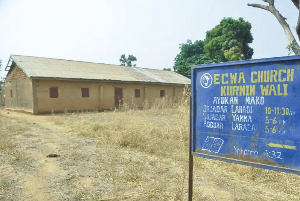By Joseph Annor
Periodically, some traditional council and/or rulers of many areas in Ghana impose bans lasting as long as a month or more, to restrict people living within their jurisdiction from making any form of noise including funerals. Generally, a chief may impose a ban during and including the period leading to the following occasions.
(1) The celebration of the anniversary of his ascension to the throne. For example, the Asante Traditional Council placed a ban on funerals and other forms of noise for about 7 weeks between April 2014 and 25 May 2014, because the Asante King was celebrating the anniversary of his ascension to his throne.
(2) Performing a burial and funeral of a chief or a queen. For example, the Asante man Council has since about 17 November 2016 placed a ban on any form of noise making until the late Queen of Ashanti is buried. Similarly, in May 2016, the Okere Traditional Council in Eastern Region imposed a ban on funerals and weddings between 10 July 2016 to 8 August 2016, because the funeral of the late Okerehene, Osuodumgyam Otutu Kono II would occur between 2 – 8 August 2016 (see: http://www.starrfmonline.com/1.9213383
(3) The celebration of festivals such as Homowo by the Gas. The Ga Traditional Council usually imposes a one month ban every year on any form of noise during the celebration of the festival.
It is important to mention that the announcement of the bans come with a warning that a breach of the ban carries punishment. In the past, some people have advocated that the imposition of usually, a month long ban causes harm to people living within those traditional areas. For example, in 2014, Nene Abayateye Amegatcher who was the President of Ghana Bar Association considered seeking an interpretation from the Supreme Court on the legality of such bans because of the burden it imposes on the people (see: http://www.peacefmonline.com/pages/local/social/201405/201582.php). Moreover, Nana Odeneho Kyeremanteng (also a lawyer) while commenting on the issue explained that the bans are bad for the economy because they affect some businesses (see: http://www.ghanaweb.com/GhanaHomePage/NewsArchive/Traditional-leaders-can-t-ban-noise-making-311473).
In addition, in 2014, Rockson Adofo in an article published on Ghanaweb explained that the seven weeks ban that Otumfor Osei Tutu imposed on noise making in Asante man was not reasonable and infringed upon the fundamental human rights of the people living within the Asante man Council. In particular, Rockson highlighted how the ban would affect families that could not perform the funerals of their dead ones. (see: http://www.ghanaweb.com/GhanaHomePage/features/The-Implications-of-Banning-Funeral-While-Otumfuo-Celebrates-His-303447).
While I do not necessarily have problem with the traditional councils imposing such bans, I strongly believe that any ban longer than one week is inappropriate because it causes significant hardship and unreasonable burden on many people.
It is significant to note that the tradition of banning noise making was established several centuries ago. At that time the Ghana population was very low and therefore, places such as Accra and Kumasi had low population. Accordingly, it was possible that imposing one month ban on people in order to prepare for royal funerals or celebrate traditional festivals would not cause too much harm, as for example, not many people were dying during that period. Meanwhile Ghana is now democratic and the application of any traditional customs must be consistent with the democratic values and not infringe on the freedom of the people.
More so, the population has increased and aged, the society has become dynamic and diverse and many parts of Ghana, particularly, Accra and Kumasi have become very cosmopolitan. Therefore, the rights of many people are infringed upon during the period of such bans. For example, churches are prevented from using microphones and etc. during church services. Although, it is true that some churches make a lot of noise during their services. And in some cases, the level of noise is so high that it causes significant disturbance to people living near where the church services are held, particularly during the early morning and late night. Accordingly, the churches that are close to residential areas should reduce their noise to a reasonable and acceptable level after 9 pm and before 5 am, and closing the church doors fully can in some cases help. However, restricting churches entirely from using their musical instruments for a month or so just because a chief or traditional council is celebrating a festival appears inappropriate.
More importantly, the chiefs cause significant hardship to families when they are prevented from having the funerals of their loved ones during the period of the ban. As indicated earlier, the population has grown significantly since these customs were first developed. Accordingly, many people are dying and for that matter, it does not make sense for one person or traditional council to take one whole month for himself or itself just to prepare and celebrate a festival or a royal funeral, while others are prevented from having funerals for their loved ones who have passed on. Some poor people are forced to keep their dead ones in the mortuary for months during and after the period of the ban as there will be a backlog of funerals to be organised, which will take several weeks if not months to clear. This clearly shows it simply does not make sense to impose these unreasonable lengthy bans on people.
Moreover, organising funerals and weddings require some planning. There are some people who plan funerals and weddings months ahead. Therefore, to abruptly prevent such people from having their funerals or wedding as they had anticipated is not fair. For example, the Asante Queen died about 14 November or so and by 17 November the ban on funerals was put in place until the Queen is buried, which no one knows exactly when. Accordingly, all families who have planned for funerals after 17 November would have to wait despite they would have incurred some costs. Accordingly, it appears inhumane that people are suddenly prevented from holding funerals despite the initial high costs involved in the preparation for the funerals. I note that in the case of the Asante Queen, there is at least a provision allowing people to bury their loved ones which is good to some extent because the deceased bodies do not have to be kept at the mortuary. However, the provision does not solve the entire problems of the ban because it is cheaper to have the funeral on the same day that the person is buried. Moreover, many dead people have their children overseas therefore having burial and funeral some weeks or months apart is not ideal because the one coming from overseas may not have the convenience of being at the burial and the funeral scheduled on different dates. The person coming from abroad may not have the financial ability or adequate leave from employer to come for both the burial and the funeral occurring on separate dates. Meanwhile it will be a devastating blow to some people particularly, the women if they were to miss either the burial or funeral of their parents and it can devastate them for the rest of their lives. Thus, it is ideal that everyone one will be present during the burial and funeral of their parents so he or she can be at peace with him/herself for the loss of the loved one.
Accordingly, in 2014, someone came from Australia to visit her ill parent and unfortunately, the parent died soon after her arrival. However, because the Asantehene had placed a ban on funerals due to his anniversary of ascending to his throne, the person had to wait for unreasonable period of time before the funeral could be organised. And some of the obvious challenges in cases like this are financial, how to convince one’s employer in order to extend one’s leave and whether the person has further leave accumulated. It is even more challenging if the person has children and what to do with them if she has to stay longer as that may affect their schooling and etc.
In fact beside the financial costs, grieving families also go through hectic time and the intensity of their grief continues until their loved one is buried and the funeral is held. Therefore, restricting people from having funerals increases their pain. I only understood the pain people feel when my mother passed away.
In conclusion, I think the traditional authorities have to recognise that time has changed and therefore, it is not appropriate to preventing people for a month or long from having the funerals of their loved ones. Some families just simply want to have the funerals of their loved ones and move on. Accordingly, I think the only appropriate thing is that the chiefs have to impose only one week ban on funerals, weddings and etc. The fact is that all activities relating to a festival or royal funeral usually peak within a certain week. I think it is only fair and reasonable that any ban will be confined to this peak period so that people do not suffer extremely unreasonably. Accordingly, unless the chiefs become realistic with the changing times and take a compromise position, there will come a time that someone will challenge them and the Supreme Court may rule against them and they will have no basis to impose a ban at all.
Opinions of Thursday, 29 December 2016
Columnist: Annor, Joseph














